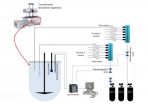(Press-News.org) A breakthrough in drug testing developed by a University of Huddersfield lecturer could lead to cheaper, more effective medicines. Dr Hamid Merchant is a member of the team that has created a device which accurately simulates the gastro-intestinal tract and how it absorbs medication. This means that the cost of clinical trials could be greatly reduced, with savings passed on to customers.
Dr Merchant has joined the University as a Senior Lecturer in Pharmaceutics. Previously a postdoctoral fellow at University College London (UCL), he has extensive research experience, with a speciality in drug delivery and formulations. He has published regularly in peer-reviewed journals and made presentations to prestigious bodies that include the American Association of Pharmaceutical Scientists, to whom he has described his work in developing the apparatus for testing the solubility of medicines in their annual meeting and exposition in November 2013 at St Antonio (Links to abstracts... AAPS 2013-R6065, AAPS 2013-T3050, AAPS 2013-W5338, AAPS 2013-T3119, AAPS 2013-R6310).
The device is the subject of a patent application – with potential commercial partners already expressing interest – and a working prototype has been constructed at UCL. It has already been used, under contract, by drug companies in order to test new products. Dr Merchant now aims to establish a second prototype at the University of Huddersfield.
Dr Merchant explained that the cycle for developing and delivering a new drug involves pre-clinical tests on animals. If these are deemed safe and satisfactory, clinical trials on humans can then begin. But differences between animal and human gastrointestinal tracts mean that the pre-clinical tests do not always provide sufficiently reliable information about drug absorption from differing formulations. This has to be investigated – at considerable expense – during the clinical trial phase.
Therefore, Dr Merchant and his colleagues developed a laboratory device that simulates the human gut and its differing pH gradients, which play a decisive role in determining the manner, in which orally-administered medications are dissolved and then absorbed. It is now possible to fairly discriminate the formulations of a new drug and identify potential candidates for further development that are likely to be successful during clinical trials.
"By minimising human trials we would reduce the cost of development, which is then charged to patients when the drug comes to the market – if the development costs are lower, then we can make new drugs more affordable," said Dr Merchant, who has research experience in industry as well as academia.
The testing device, co-developed by Dr Merchant, includes a chamber for holding a solvent medium plus a pH probe and a control unit. This monitors changes in the pH of the solvent medium in order to test the performance of a drug carrier at different levels of acidity or alkalinity, mimicking the conditions of the gastrointestinal tract. The device is particularly suitable for testing and developing dosage forms for oral delivery of drugs and can also simulate the variability between individuals.
INFORMATION: END
Researchers develop device that simulates gastro-intestinal tract
New device simulates the gastro-intestinal tract and how it absorbs medication
2014-03-31
ELSE PRESS RELEASES FROM THIS DATE:
Certain genetic variants may identify patients at higher risk of bladder cancer recurrence
2014-03-31
While patients diagnosed with bladder cancer usually face a favorable prognosis, many experience recurrence after treatment. Because frequent, painful screenings are needed to identify recurrences, the ablility to identify patients at high risk of recurrent cancer could help to improve quality of life for all bladder cancer patients.
A new study published in BJU International, "Genetic polymorphisms modify bladder cancer recurrence and survival in a U.S. population-based prognostic study," suggests that certain inherited DNA sequences may affect a bladder cancer patient's ...
Heparin more effective than bivalirudin in patients during emergency heart procedure
2014-03-31
WASHINGTON (March 31, 2014) — In a comparison of two blood-thinning medications, heparin was associated with significantly fewer major cardiovascular events at 28 days than bivalirudin in patients receiving primary percutaneous coronary intervention after a heart attack, according to research presented at the American College of Cardiology's 63rd Annual Scientific Session.
The single-center, open label trial enrolled 1,829 patients with suspected heart attack who received a coronary angiography, an imaging test to see how blood flows through the heart. Patients were randomized ...
Anti-anxiety drugs and sleeping pills linked to risk of death
2014-03-31
Anti-anxiety drugs and sleeping pills have been linked to an increased risk of death, according to new research from the University of Warwick.
The large study, published in BMJ, shows that several anxiolytic (anti-anxiety) drugs or hypnotic drugs (sleeping pills) are associated with a doubling in the risk of mortality.
Although these findings are based on routine data and need to be interpreted cautiously, the researchers recommended that a greater understanding of their impact is essential.
Professor Scott Weich, Professor of
Psychiatry at the University of ...
Drug-eluting stents demonstrate better outcomes after 1 year than bare metal stents
2014-03-31
WASHINGTON (March 31, 2014) — Use of drug-eluting stents is associated with a lower risk of major cardiovascular events at one year compared to bare metal stents when followed by an individualized course of blood-thinning medication among patients previously thought to be uncertain candidates for drug-eluting stents due to their heightened risk of bleeding or blood clots, according to research presented at the American College of Cardiology's 63rd Annual Scientific Session.
Positive study findings for patients receiving a shorter than currently recommended course of ...
Never say never in the nano-world
2014-03-31
This news release is available in German.
Objects with sizes in the nanometer range, such as the molecular building blocks of living cells or nanotechnological devices, are continuously exposed to random collisions with surrounding molecules. In such fluctuating environments the fundamental laws of thermodynamics that govern our macroscopic world need to be rewritten. An international team of researchers from Barcelona, Zurich and Vienna found that a nanoparticle trapped with laser light temporarily violates the famous second law of thermodynamics, something that ...
New human trial shows stem cells are effective for failing hearts
2014-03-31
WASHINGTON (March 31, 2014) — Patients with severe ischemic heart disease and heart failure can benefit from a new treatment in which stem cells found in bone marrow are injected directly into the heart muscle, according to research presented at the American College of Cardiology's 63rd Annual Scientific Session.
"Our results show that this stem cell treatment is safe and it improves heart function when compared to placebo," said Anders Bruun Mathiasen, M.D., research fellow in the Cardiac Catherization Lab at Rigshospitalet University Hospital Copenhagen, and lead investigator ...
Real-world heart procedure results consistent with scientific research
2014-03-31
WASHINGTON (March 31, 2014) — The first one-year outcomes data of transcatheter heart valve replacement (TAVR) in nearly all U.S. patients undergoing this procedure shows that real-world outcomes are comparable to or slightly better than those found in clinical trials, according to registry data presented at the American College of Cardiology's 63rd Annual Scientific Session. However, specific baseline characteristics of patients undergoing TAVR are associated with differing degrees of death and survival and may be important considerations for patient counseling and shared ...
Newly discovered molecule may offer hope for immune disorders and runaway inflammation
2014-03-31
A new research discovery published in the April 2014 issue of the Journal of Leukocyte Biology may open the door to new therapies that help treat immune disorders or curb runaway inflammation. Specifically, scientists have discovered a molecule that can induce cell death (apoptosis) in a key type of immune cell (dendritic cells). With this understanding, it may be possible to develop new therapies that essentially shut down dendritic cell activity, and thereby reducing an immune reaction.
"We hope that our findings provide better understanding of immune regulation, which ...
NASA releases images of X-class solar flare
2014-03-31
The sun emitted a significant solar flare, peaking at 1:48 p.m. EDT March 29, 2014, and NASA's Solar Dynamics Observatory captured images of the event. Solar flares are powerful bursts of radiation. Harmful radiation from a flare cannot pass through Earth's atmosphere to physically affect humans on the ground, however -- when intense enough -- they can disturb the atmosphere in the layer where GPS and communications signals travel.
To see how this event impacted Earth, please visit NOAA's Space Weather Prediction Center at http://spaceweather.gov, the U.S. government's ...
Stats show growth of breast lifts outpacing implants 2 to 1
2014-03-31
VIDEO:
New statistics from the American Society of Plastic Surgeons show that since 2000, breast lift procedures have grown by 70 percent, twice the rate of breast implants. According to the...
Click here for more information.
ARLINGTON HEIGHTS, Ill., March 31, 2014 – New statistics released today by the American Society of Plastic Surgeons (ASPS) show that breast lift procedures are growing at twice the rate of breast implant surgeries. Since 2000, breast lifts have grown by ...
LAST 30 PRESS RELEASES:
Fecal transplants from older mice significantly improve ovarian function and fertility in younger mice
Delight for diastereomer production: A novel strategy for organic chemistry
Permafrost is key to carbon storage. That makes northern wildfires even more dangerous
Hairdressers could be a secret weapon in tackling climate change, new research finds
Genetic risk for mental illness is far less disorder-specific than clinicians have assumed, massive Swedish study reveals
A therapeutic target that would curb the spread of coronaviruses has been identified
Modern twist on wildfire management methods found also to have a bonus feature that protects water supplies
AI enables defect-aware prediction of metal 3D-printed part quality
Miniscule fossil discovery reveals fresh clues into the evolution of the earliest-known relative of all primates
World Water Day 2026: Applied Microbiology International to hold Gender Equality and Water webinar
The unprecedented transformation in energy: The Third Energy Revolution toward carbon neutrality
Building on the far side: AI analysis suggests sturdier foundation for future lunar bases
Far-field superresolution imaging via k-space superoscillation
10 Years, 70% shift: Wastewater upgrades quietly transform river microbiomes
Why does chronic back pain make everyday sounds feel harsher? Brain imaging study points to a treatable cause
Video messaging effectiveness depends on quality of streaming experience, research shows
Introducing the “bloom” cycle, or why plants are not stupid
The Lancet Oncology: Breast cancer remains the most common cancer among women worldwide, with annual cases expected to reach over 3.5 million by 2050
Improve education and transitional support for autistic people to prevent death by suicide, say experts
GLP-1 drugs like Ozempic could cut risk of major heart complications after heart attack, study finds
Study finds Earth may have twice as many vertebrate species as previously thought
NYU Langone orthopedic surgeons present latest clinical findings and research at AAOS 2026
New journal highlights how artificial intelligence can help solve global environmental crises
Study identifies three diverging global AI pathways shaping the future of technology and governance
Machine learning advances non targeted detection of environmental pollutants
ACP advises all adults 75 or older get a protein subunit RSV vaccine
New study finds earliest evidence of big land predators hunting plant-eaters
Newer groundwater associated with higher risk of Parkinson’s disease
New study identifies growth hormone receptor as possible target to improve lung cancer treatment
Routine helps children adjust to school, but harsh parenting may undo benefits
[Press-News.org] Researchers develop device that simulates gastro-intestinal tractNew device simulates the gastro-intestinal tract and how it absorbs medication



